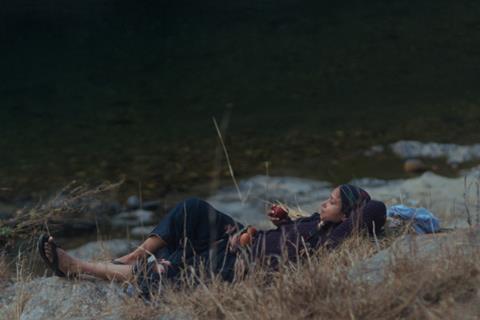Indian director Nidhi Saxena draws on folklore for her atmospheric sophomore film

Director/scr: Nidhi Saxena. India/Sri Lanka/Italy. 2025. 108mins
It laps at the senses, this long Hindi-language audio-visual poem by Indian director Nidhi Saxena, using silences and absences to tell a story set in a remote Himalayan town during the Kargil War of the late 1990s. This tale of a lonely woman drawn to an outsider is steeped in legend, but also in the lived daily experience of Indian women.
An evocative, ethereal mood piece
Saxena’s second film after Sad Letters of an Imaginary Woman, which premiered at Busan in 2024, Secret Of A Mountain Serpent is one of three features premiering this year at Venice that were selected and part-funded by the festival’s Biennale College Cinema scheme. Previous Biennale College launches have gone on to have brilliant careers – among them Lemohang Jeremiah Mosese’s This Is Not A Burial, It’s A Resurrection (2019) and Rohan Parashuram Kanawade’s Cactus Pears (2023), both of which picked up prizes at Sundance. Saxena’s evocative, ethereal mood piece is likely to see, at the very least, plenty of further festival action.
It’s clear early on that this is a story that is in no hurry to wake up, stretch and reveal itself. The setting is a mountainous area of rural Indian – a mention of the town of Almora reveals it to be the Kumoan region of the state of Uttarakhand, in the foothills of the Himalayas.
A group of local women pace through a forest of tall trees bearing bundles of straw. They pause by a river and one takes her time eating an apple. Standing up to continue on her way, she feels something, freezes, and looks down to see a black snake entwined around her lower leg. An intertitle recounts a legend about a woman who, long ago, was held by a snake while crossing the river, and made a promise she didn’t keep. Since then, it’s said, the river has been off limits to women.
Radio news reports place the film in 1999, at the time of the Kargil War between India and Pakistan. The men are away soldiering, leaving women like schoolteacher Barkha (Trimala Adhikari) alone with her young charges. She’s teaching them about avian migration, but the only bird here is one heard but never seen, piping a few brief notes from the treetops.
A mysterious stranger played by Life Of Pi star Adil Hussain appears in the village, and Barkha seems shyly drawn to him. He tells her he’s an engineer working on a dam project. But facts are slippery things in a film that has only one foot in the real world. When Barkha’s husband Sudheer (Pushpendra Singh) returns from the war, bringing her a pair of shiny golden shoes, it’s uncertain if he’s really there. Perhaps both he and the stranger are creations of her conflicting desires?
With its repeated snake, bird and apple motifs, Secret Of A Mountain Serpent feels like a film made from a tapestry hanging on the wall of a Kumoan village house. People are seen weaving, darning and sewing – interestingly, it’s men who engage in the latter two activities, in the military camp where Sudheer is posted. But there are ominous threats of violence too: men with torches running between burning houses, boots marching, all part of a textured background sound design by Niraj Gera – taking in distant war rumbles, sandstorms, creaking trees – that does much to carry the film’s sense of otherness.
The director also uses disjuncts between dialogue and character to atmospheric effect – whispered voice-overs that may be inner thoughts, snatches of poetry, songs of tragic love. In a still tableau lasting for several minutes showing a seated woman gazing into a flickering fire, the song heard, with its lyrics about an “indifferent beloved “ who “sits in a land afar”, occupies a kind of limbo space. It appears to be non-diegetic - but then tears roll down the woman’s face, and it’s impossible not to attribute these to the heart-wrenching lyrics.
Sensitively shot by DoP Vikas Urs, with several night scenes making haunting tableaux from firelight on faces against a blue background, Saxena’s second feature will reward patient audiences who are not too bothered about explanations, or are happy to provide their own. Some will find the visual symbolism – especially the apple strand – too insistent, and the director’s fondness for dissolves feels excessive, flagging the poetic in a film which is otherwise admirably restrained.
Production companies: Forest Flower Films
International sales: The Open Reel, open@theopenreel.com
Producers: Vimukthi Jayasundara
Cinematography: Vikas Urs
Production design: Avni Goyal
Editing: Salman Alvitigala
Music: Ananyaa Gaur, Nishant Ramteke
Main cast: Trimala Adhikari, Adil Hussain, Richa Meena, Pushpendra Singh, Aaradhya Mehta
























